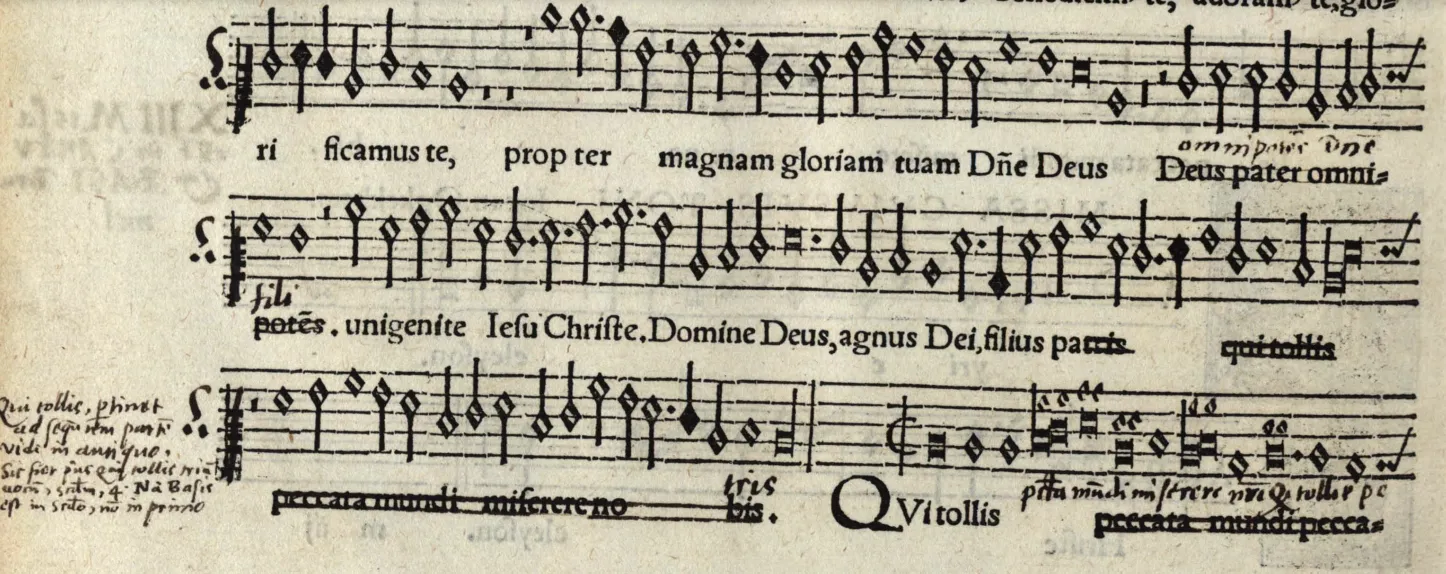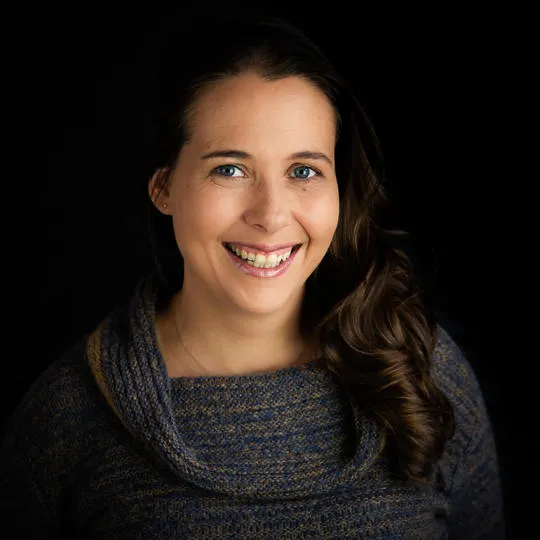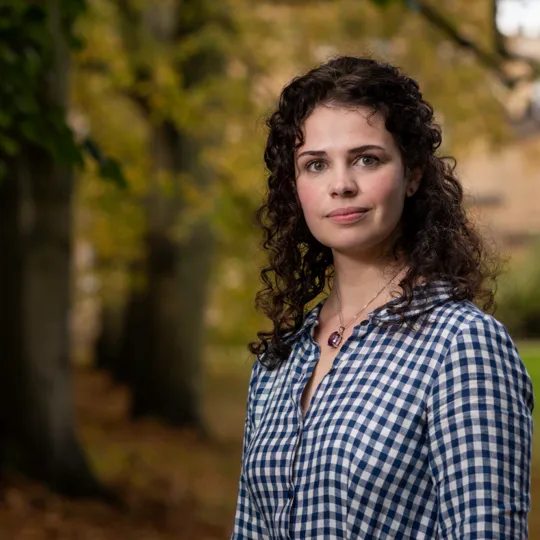DORMEME: Dissemination, Ownership, and Reading of Music in Early Modern Europe

Image citation: Liber quindecim missarum, à præstantissimis musicis compositarum (Nuremberg, 1539), Tenor book, fol. 47v. Copy owned by Ludwig-Maximilians-Universität, Universitätsbibliothek, München, Cim. 44n(1 (= 4° Liturg. 448).
Who owned and read music books in early modern Europe? Who had access to printed musical material, how did they interact with it, and to what end? To investigate these broad questions and thus approach the musical source from the perspective of its consumption, is the aim of this interdisciplinary project. It centres on the time from 1500-1545 – a period in which the application of printing from type for music accelerated the availability of musical sources. Along with this expansion came a rise in musical literacy. Being able to read music opened up new avenues: individuals could teach themselves instruments, partake in musical groups and, at times, participate through this format also in new religious discourses. However, to date we have very little information on who these new readers were and how they interacted with their musical sources. By investigating the three categories of the dissemination, ownership and reading of early music books this project addresses the wider topic of musical literacy, allowing us to find out more about the individuals that made up the musically- literate part of society as well as the interaction of literacy with other forms of dissemination.
In answering these questions this project aims to decisively shift the discourse around early music books from their production to their consumption. Building on ideas and methodologies from wider book history while being aware of music’s specific status it allows to include music into the discourse around early literacy as well as provide tools for describing and analysing annotations and reading habits specific to music.
Alongside a range of publications and dissemination events this project will also generate a database which investigates and describes marks of ownership and annotations in surviving copies of polyphony printed across Europe between 1500 and 1545.
Amici
DORMEME is a project whose themes intersect with research across academic disciplines and specialisms. With the profiles below, we aim to represent virtually the wider community around our work. Our amici are scholars whose research falls under or complements the three themes of our project: Dissemination, Ownership, and Reading. We will be adding to the group throughout the project and warmly encourage anyone who would like to become part of our Amici to get in touch via email.
Samantha Arten
A scholar of sixteenth-century English printed music, Dr. Arten's research investigates the mechanics of music printing in Tudor England, variability across editions, and annotations added by readers. Her dissertation and first book, Reading The Whole Booke of Psalmes, examines almost 300 copies of Reformation England’s metrical psalter, considering publishers’ choices in prefatory and paratextual material across Elizabeth’s reign and evaluating reader use, manuscript annotations and corrections, and music typesetting errors. Her next project, Making Notes: Print, Music, and Readers in Tudor England considers both the processes that create printed music and the evidence of use by readers. This project will be the first of its kind to examine all possible surviving copies of all editions of music collections printed in Tudor England.
Antonio Chemotti
Antonio Chemotti is Assistant Professor at the University of Leuven (in association with the Alamire Foundation) and work leader at the Royal Library of Belgium in the context of the FED-tWIN programme "From Script to Sound: Connecting Heritage and Art through Research and Technology". His research focuses on late medieval and early modern Europe, in particular Central Europe, Italy, and the Low Countries.
Ferran Escrivà-Llorca
Ferran Escrivà-Llorca is Associate Professor at International University of Valencia (VIU) as a historical musicologist. He leads the MUSURBA group, which researches the history of music in Valencia from the perspective of urban musicology and material culture. He is involved in several research teams at the European level. His interests focus on patronage, cultural diplomacy, and the study of soundscapes as a framework for music history. He works on reconstructing the circulation, distribution, and possession of music books in Early Modern Spanish territories.
Marianne C.E. Gillion
Marianne C.E. Gillion is a Marie Skłodowska-Curie Postdoctoral Fellow in the Department of Musicology at Uppsala University with her project Resounding Worship: Networks of Musical Devotion in the European Reformations, 1520-1648.
Her research explores how plainchant used in public worship challenged, shaped, and expressed identities in times of cultural upheaval. Marianne combines methods from musicology and book history to investigate how chant served as a form of connection. She traces liturgical books through the stages of their life cycles — commissioning, production, transmission, use, and adaptation — to reveals how musical worship united diverse communities across political, religious, and chronological boundaries.
Matt Laube
Matthew Laube is Assistant Professor of Music at Baylor University. After completing his PhD at Royal Holloway, University of London in 2014, he held postdoctoral positions in London, Cambridge, and Brussels. His research focuses on the place of music in the religious and political upheavals of northern Europe 1450–1650 and the role of music printing — and printers — in German and Dutch contexts. He is especially interested in hymnbooks and psalters and is writing a monograph on music in Reformation Heidelberg.
Zanna van Loon
Zanna Van Loon is Curator of Rare Books and Manuscripts at the Museum Plantin-Moretus in Antwerp, Belgium. Her research interests include the materiality and sociality of the early printed book, book trade networks and print culture. She previously worked as the expert on analytical bibliography and the project leader of STCV: The Bibliography of the Hand Press Book at the Vlaamse Erfgoedbibliotheken vzw. In 2020 Zanna obtained a Ph.D. in Early Modern Book History at KU Leuven on the social and material characteristics of early modern manuscripts and printed books on Indigenous languages of North and South America. Her monograph on the subject will appear soon at Amsterdam University Press.
Ana López Suero
Ana López Suero is a postdoctoral researcher at the University of Valladolid and an associate researcher at KU Leuven. She is currently working on the interactions between musicians from Spain and the Netherlands and the transmission of music between the two lands in the sixteenth and seventeenth centuries.
Prior to her postdoc, Ana completed her DPhil at the University of Valladolid under the supervision of Soterraña Aguirre Rincón and David Lasocki. Her research then focused on the networks of musicians in the early modern period, leading to the dissertation “The Network of Musicians in Valladolid, 1550-1650: Training, Companies, Livelihoods and Related Crafts and Trades”. During her doctoral studies, she researched a variety of topics, focusing on music and literature in the 16th and 17th centuries, musical terminology in Spanish texts, and the transmission of music between Spain and the Netherlands during the reign of the Catholic Monarchs. Her doctoral studies also included a period of research at KU Leuven under the supervision of Prof. David Burn. For many years Ana has been a flute teacher in several conservatories in Spain and an active performer in several orchestras and early music ensembles. She holds a bachelor’s degree from the Conservatorium van Amsterdam and a master’s degree from the Hogeschool van de Kunsten Utrecht.
Among her recent publications are chapters in edited volumes with Sedem and Classique Garnier. She has forthcoming articles in the journal Early Music and chapters in edited volumes with Brepols and Brill.
Sanna Raninen
Sanna Raninen is a researcher of early music, specialising in the material and visual culture of music in Early Modern Europe. Sanna is currently a Post-doctoral Research Fellow at Uppsala University, conducting a project on the cultural history of music books in Early Modern Sweden, funded by the Swedish Research Council. Previously Sanna was a Research Fellow at the Finnish Literature Society, conducting a project funded by Kone Foundation on the material culture of music books in Post-Reformation Sweden. In years 2015–2017 she was a Research Associate for a Leverhulme-funded project Music in the Art of Renaissance Italy at the University of Sheffield. Sanna completed her PhD at the University of Manchester, as part of an AHRC-funded project Production and Reading of Music Sources 1480–1530, focussing on the production methods and use of printed sources of polyphony during the early sixteenth century. In addition, her research interests include interpretations and adaptations of music history in popular culture.
Kristof Selleslach
Kristof Selleslach is Curator of Archives at the Museum Plantin-Moretus in Antwerp (Belgium). He is making the business and family archives of the Officina Plantiniana accessible. In a previous project he developed the Torad database of typographical ornaments used by Antwerp printers 1541–1600. His research topics relate to the Plantin Press, including the succession of the family business to the next generation, the privilege policy, and the journeymen on the shop floor. He started a PhD at the University of Amsterdam (the Netherlands) on the intergenerational succession and transformation of the Officina Plantiniana in the seventeenth century. In addition, he is the editorial secretary and editor of De Gulden Passer | The Golden Compasses, a leading journal for book history.
Katarzyna Spurgjasz
Katarzyna Spurgjasz is a musicologist, historian and ex-librarian. Constantly developing her own musical literacy, as well as building up a collection of newly discovered sources, she focuses on the cultural history of early modern music, particularly in multilingual and multiconfessional environment of Central Europe. Her research plans for upcoming months include such topics as music education and its echoes in 16th-century sources (including work on an unknown handwritten treatise from Wittenberg), and traces of orality in the ‘literate’ musical output from the same period. She also continues her research on early modern music collections from Silesia.
Caro Lesemann-Elliott
Caro Lesemann-Elliott gained their PhD at Royal Holloway, University of London in the summer of 2023 with a thesis on music at exiled English convents. They recently held a post as Visiting Research Fellow in Musicology at the Bodleian Libraries (Oxford University), examining the Blount Music Collection. They are currently a post-doctoral research assistant at Royal Holloway as part of the AHRC project ‘Music, Heritage, and Place’, a collaboration between Royal Holloway, Newcastle University, and County Record Offices across England. They direct an early music ensemble, the Basilinda Consort, dedicated to exploring the musical lives of English Christian women religious. Their most recent publication can be read here.
Kirsten Gibson
Kirsten Gibson is Professor of Early Modern Music and Culture at Newcastle University, UK. Her research focusses on situating early modern and eighteenth-century English music in wider cultural, social and political contexts. Her work has appeared in Early Music History, Journal of the Royal Musical Association, Renaissance Studies, Early Music, The Library and Music and Letters. She is co-editor (with Ian Biddle) of Masculinity and Western Musical Practice (2009) and Cultural Histories of Noise, Sound and Listening in Europe, 1300–1918 (2017), and (with Stephanie Carter and Roz Southey) Music in North-East England, 1500–1800 (2020). She is currently a Co-Investigator on the Arts and Humanities Research Council-funded project ‘Unlocking the Musical Collections of England’s County Record Offices’. This project is uncovering sometimes little known music manuscripts and printed music from c.1550 to c.1850 held in local archives across England and revealing previously untold stories about the men and women active in musical life of past centuries.
Andrew Frampton
Andrew Frampton is Lecturer in Music at St Catherine’s College, University of Oxford, and a Postdoctoral Research Associate at Newcastle University on the AHRC-funded project 'Music, Heritage, Place'. He read for a DPhil in musicology at Merton College, Oxford, and also holds an MMus in musicology from the University of Melbourne as well as an MA in Library and Information Studies from University College London, for which his dissertation was awarded the IAML E.T. Bryant Memorial Prize. Andrew’s research focuses on sources of Central European music of the eighteenth century, especially the music of Johann Sebastian Bach and his circle. He is an Associate Fellow of the Higher Education Academy, a trustee of the Music Libraries Trust and the New Berlioz Edition, and a member of the council of Bach Network.

Principal Investigator
Investigators
Affiliations
Funding
Funding Body: UKRI ESRC
Amount: €1.47 Million
Period: October 2022 - September 2027



